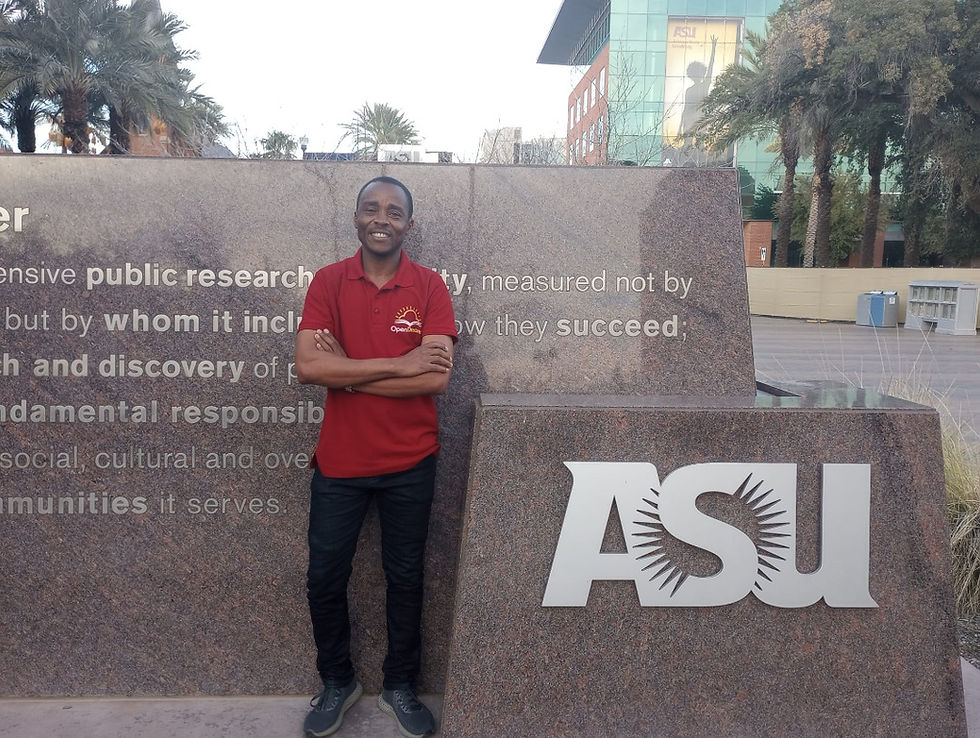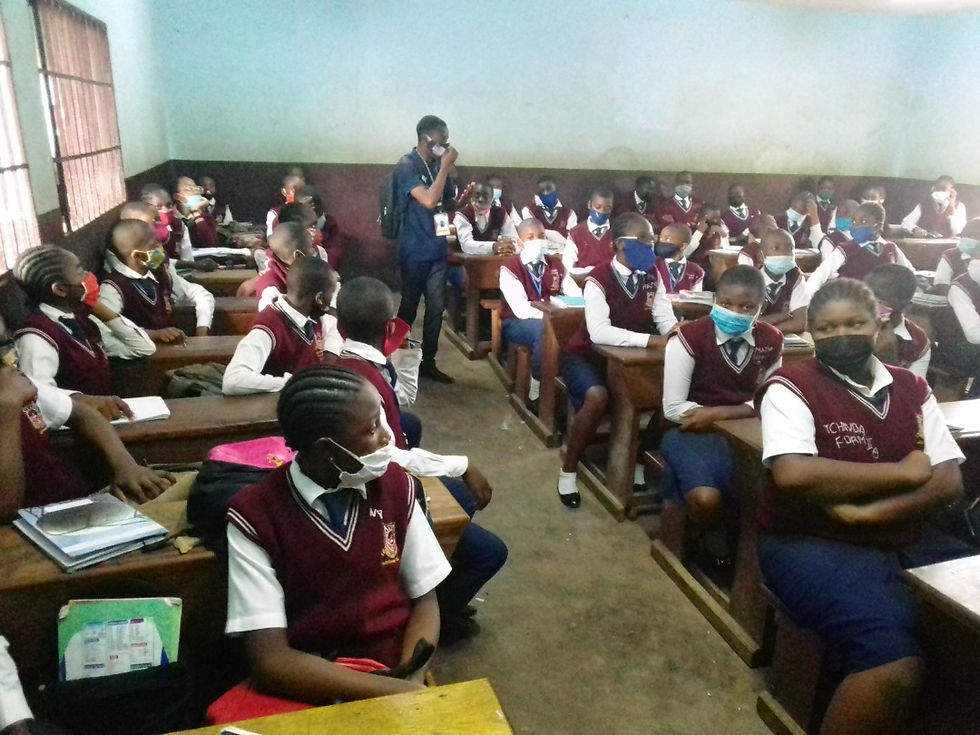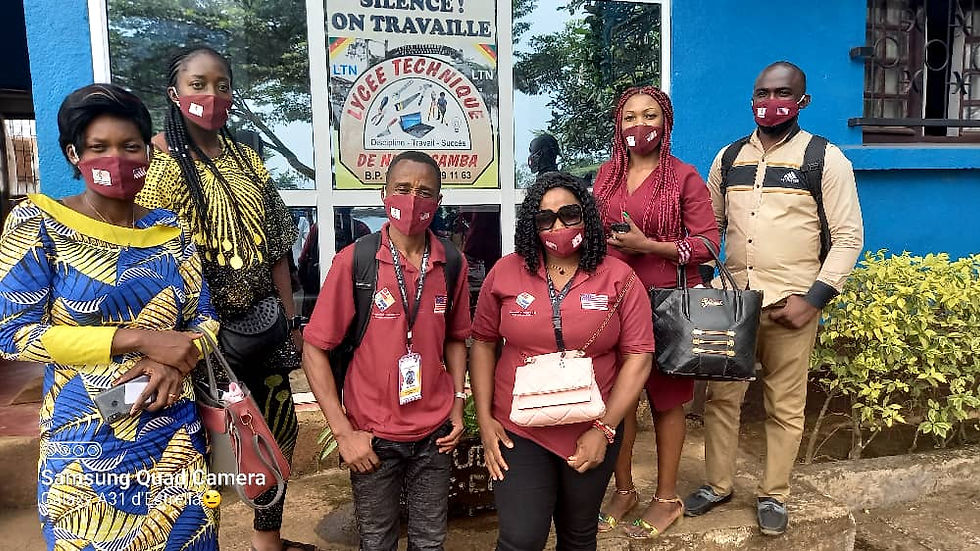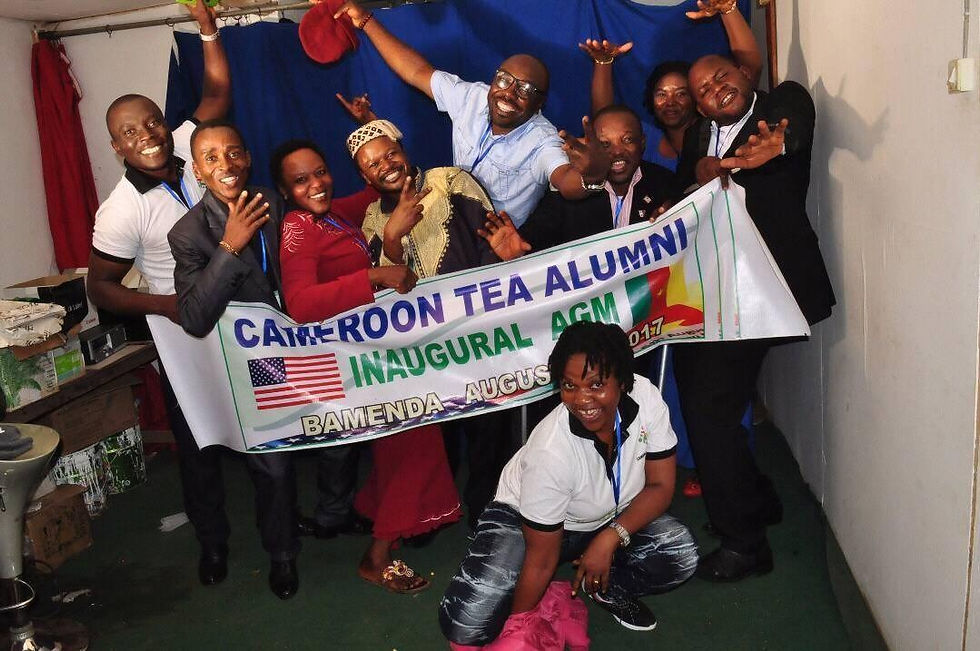My Journey to the Fulbright Program - Nteta Philip Nfon
- Open Dreams

- Jan 12, 2023
- 8 min read
Updated: Jan 13, 2023
Like many children of my generation, I grew up dreaming of becoming a pilot, engineer, or physician. It might have been motivated by a desire to join the ranks of extraordinary professionals, inventors and life savers. This is from the lens of a young boy growing up in a typical village setting in the North West Region of Cameroon through the 1990’s. As I transitioned from primary through secondary to high school, those dreams did not fade away as I was more determined to keep driving towards them. Upon graduation from high school, the reality of life became apparent as I realized that my childhood dreams were mere wishes. It was then that I began to feel the challenge of continuing to dream in line with the career goals that I had set earlier. Yes, it was difficult to continue on that merry-go-round dream-lane due to the limited professional opportunities in pursing them in my country. At that time, there were no training schools for pilots; and engineering and medical training opportunities were highly limited with admission into the existing training institutions highly challenging due to several factors above my ability.

In a strange twist of fate, after graduating from high school, I passed the competitive examination and was admitted to the Higher Teacher Training College (ENS) Yaoundé - Annexe Bambili to train as a Physics Teacher. The early days of my career, as an educator, were sustained by a fulfillment I had gained from teaching my peers back in high school.

The teaching profession then gave me the opportunity to pursue what I was passionate about and a desire to rise above all odds to be counted among the finest. In this light, I quickly developed a teaching goals mindset, integrated into several professional networks, coordinated extracurricular activities in my schools, published books in my teaching area - Physics and engaged in several learning opportunities to expand my know-how, both academically and professionally. I backed a BSc in Physics from the Faculty of Science of the University of Yaoundé 1 and later, a Graduate Teaching Diploma (DIPES II) in the teaching of Physics from the Higher Teacher Training College (ENS) Yaoundé. Never did I know that these engagements were more of profile building rather than satisfying an urge to realize my passion. I was equally moved at that time by a desire to make a contribution to mitigate the challenges of our environment. I did this through the Environment Club of my school. Inspired by this activity, I decided to pursue an MSc. in Environmental Engineering in the University of Padua, Italy, through the National Advanced School of Public Works Yaoundé, Cameroon, from 2013 to 2016.

After graduating from the MSc program, transitioning into an engineering career was certainly not easy. It was partly due to the numerous engagements in education I was involved in at the time. This was further compounded by the enthusiasm I was immersed in following my return from the Teaching Excellence and Achievement (TEA) program in the US in 2015, and my participation in the International High School Teacher (HST) program in CERN at Geneva, Switzerland in 2018. Through the programs, I derived motivation and became more responsive to the problems of education in several areas. With this drive, I championed the creation of the Cameroon Fulbright TEA Alumni Association in 2016 and was voted its pioneer president the following year. Through this mandate, I was able to establish the organization's initial structures and transformed it into a genuine non-profit. I won several grants to run education-related projects in communities across the 10 regions of Cameroon through the organization.

There are countless examples of our contributions through funded projects - notably our response to the latest global pandemic through the Covid-19 Brigade for Safe Schools in Cameroon, our works on combating School-related Violence, the promotion of STEM Education and trainings on Inclusive Learning Initiatives, Environmental Education and the use of Instructional Technologies.
Even though I have been more absorbed by the drive of creating a bigger impact while staying at the forefront in making the world better, the desire to improve on my competencies and give the best expression of myself hasn’t been impeded. I realized that this could only be possible if we do not stop learning and continue to reexamine our past dreams. I have also come to understand that one has to have a flexible mindset when looking for ways to accomplish his/her dreams. This could be done by grabbing opportunities that come our way to keep moving. No matter how many times I say it, I haven't stopped realizing how critical it is to never say it's over about your dreams. It is this spirit that kept me moving as I was battling to win the Fulbright Foreign Student scholarship.

I can’t remember, with precision, when I first learned of the Fulbright Scholarship. However, I believe that it could have happened sometimes after I finalized my BSc. studies in Physics. After High School, I had suffered setbacks in academics as my performance oscillated within Bs and Cs. The highest grade I recorded during my BSc studies in Physics in the University of Yaoundé 1 was a B. Most of my course grades were between 10.00 and 12.50 on a scale of 20, while some of them were validated after one, two or three attempts. This state of affairs crippled the confidence and dreams that were once part of me. My carefree attitude toward a highly prestigious scholarship like the Fulbright at that time could have been due to the believe that it was exclusively for the brightest minds in the category A academic class.
It was only after my selection and participation in TEA program that I recognized that there is something remarkable about me. I realized that I could equally be counted among the best in Cameroon in my specialty-teaching, after I got selected for the TEA program in the Fall of 2015. It was during one of the program's welcome workshops in Washington DC that the motivation to try my luck on the Fulbright scholarship was sparked. During that event, a former participant of the TEA program, from Pakistan, who had just returned to the US for graduate studies, under the Fulbright Foreign Students program banner, made a passionate presentation on her community engagements and how the TEA program transformed her into the quality of leader she was at the time. After hearing her story, I took a commitment to return from the TEA program and be more engaged in contributing to make Cameroon a better place - thereby building a richer profile that could facilitate my selection for the Fulbright and return to the US for graduate studies, one day, just like her. This is how the Fulbright dream in me was born!

I first applied for the Fulbright scholarship during the 2017/2018 application season for Cameroon. This attempt left me crashing out of the race at the interview stage as I ended as an alternate nominee. The following year, I reapplied, advanced through the interview phase and was nominated by the US Embassy in Cameroon to the Fulbright Scholarship Board, as one of the candidates from Cameroon for the scholarship. This second attempt hit a giant rock, once again, even though I had been offered admission to some US universities following the submission of my application files to the institutions by the Fulbright Scholarship Board. At that time, it wasn’t clear to me what my Fulbright application decision meant. The feedback I received kept me hoping that I could be called up at any time more funds were made available by the US government for the program that year. With the elasticity of the waiting period aggravated by the Covid-19 pandemic, I had to wait for an usually longer time before realizing that it wasn’t my year for the program again. Unfortunately, I only understood this when the application window for the 2020/2021 Fulbright application season in Cameroon had advanced beyond the interview phase. Because of this, I couldn’t apply for the scholarship that year. When the Fulbright application window for 2021/2022 season was launched, I reapplied and breezed through the selection process. On March 15 2022, I was notified on my offer to pursue an MSc in Environmental and Resource Management at the Ira A. Fulton Schools of Engineering in Arizona State University. It did indeed happen that 2022 was my year for the Fulbright scholarship even though I reapplied after much contemplation.
During my 4 to 5 years of struggle for the Fulbright Scholarship award, I realized that one’s selection for the program’s interview is highly centered on 2 key areas: The Personal Statement and Study Objective. These parts of your application must be written in an essay format of at least one page and no longer than two pages each, and in your own words. If you plan to use someone else’s work or research on them, you must credit the source at all times. Beware of plagiarism in your application as it is considered a very serious offense!!
The Study Objective helps the reviewer of your application to better understand your proposed study goals. Describe the program you want to pursue in a clear and very detailed manner through this essay by:
1) Being specific about your degree objective, major field and specialized interests within the field.
2) Explaining why you are interested in this area.
3) Describing how the kind of program you expect to undertake fits into your educational background and your future objectives and goals.
4) Stating how your study/research interest is relevant to current trends/challenges in your home country.
5) Mentioning how you intend to apply your studies upon returning to your home country.
The personal statement gives you the opportunity to introduce yourself to the reviewer of your application in the past, present and future. You should:
1) Include information about your education, practical experience, special interests, career plans, and your purpose in applying for study.
2) Explain who you are, what is of importance to you and what you intend to accomplish in your life.
3) Demonstrate your unique qualifications in your chosen field.
4) Discuss experiences, people, and events that inspired you to pursue this field of study.
5) Demonstrate your commitment to your field of study by stating the kind of contribution you will want to make or what you intend to do with your degree.
2 other critical issues that must be given serious attention to in order to receive a Fulbright award are your performances in the TOEFL and GRE examinations. You must endeavor to pass well in those 2 exams.
My life and Fulbright story is a narrative marked by dreams, loss of confidence, engagements and achievements. It reflects the path that some of our past and current Open Dreams scholars are walking through. It is a story that reflects what some of you, our aspiring scholars, will experience. It portrays resilience and how quitting a struggle isn’t a solution!

Yes! The famous writer, AMI MORIN, says thus “Quitting because you don’t want to be uncomfortable will prevent you from growing”.
Therefore, if we hope to grow, we must keep our dreams alive. Open Dreams was created to nurture and sustain those dreams. It was equally created to drive us to the realization of such dreams. It is a place for Dreamers like You and Me!
Thanks for your interest in my story. I hope it does inspire you!
I wish you Good Luck in your endeavors!
Sincerely,
Nteta Philip Nfon
Fulbright Foreign Students Program Fellow on Graduate Studies
Ira A. Fulton Schools of Engineering | Arizona State University, USA









































Comments